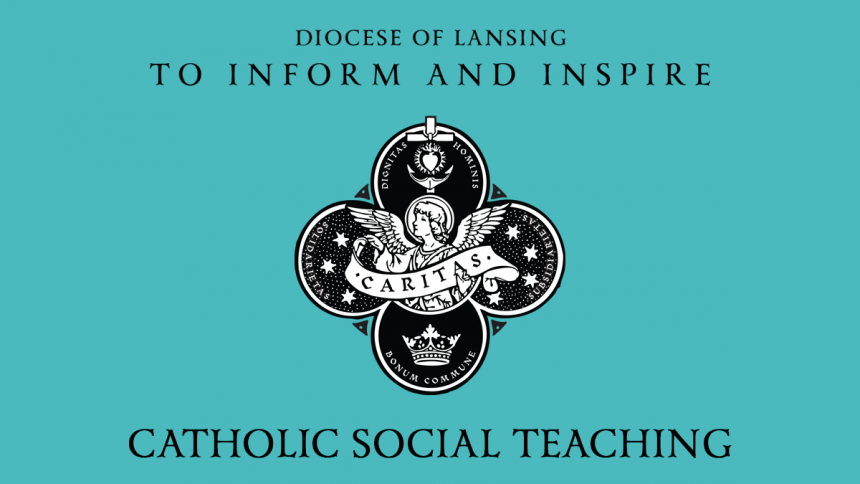
This weekend has seen parishes across the Diocese of Lansing take up a special collection for the work of the diocesan Commission on Catholic Social Teaching which supports catechetical projects which inform and inspire the practice of the Church's teaching in the world. But what is Catholic Social Teaching? That is the question answered by Bishop Earl Boyea in a pastoral letter issued to all parishes today, November 26, the Solemnity of Christ the King. Bishop Boyea writes:
November 26, 2023
Solemnity of Our Lord Jesus Christ, King of the Universe
Dear Sisters and Brothers in the Lord,
This is the third year the Diocese of Lansing is taking a collection on the Feast of Christ the King to support Catholic Social Teaching, expressing our desire that our Lord Jesus Christ may reign as king over everything we say and do. It is therefore a good time to remind ourselves of what Catholic Social Teaching (CST) is, what it is for, and what we as Catholics can and indeed must contribute to the building of a just society.
Let’s start by breaking CST down to its constituent parts.
First, CST is Catholic, meaning that it serves the Church’s evangelical mission. It is derived from our understanding of who God is, namely, three Persons, Father, Son and Holy Spirit, in one God. This same God created human beings in his image and likeness, giving us a tremendous dignity that our first parents wounded when they committed original sin and we continue to wound though our personal sins. The second Person of the Most Holy Trinity became man to redeem us when He suffered, died, and rose again, giving us an even greater dignity by allowing us to share in God’s own life forever. Our concern for each and every human person is an expression of the supernatural truths contained in the teachings of the Catholic faith.
Second, CST is Social because it addresses persons living in society, not just as individuals. While God made us morally free and responsible for our own actions, the surrounding culture inevitably shapes us too. It should be obvious that no man or woman is an island, that no one is completely self-sufficient, and certainly, no one is saved by his or her own efforts alone. We learn what is right and wrong and how to treat others from our parents, our friends and peers, our schools, various forms of media and the laws that govern us. Yet, far from being passive recipients, each of us has something to contribute to the moral fabric of society. Awareness of this fact requires us to think about what kind of society we would like to live in and act accordingly. CST urges us to reflect on the structures and institutions needed to promote the authentic dignity of the human person and the true common good of society.
Third, CST is a body of Teaching or Doctrine that should guide our thoughts and actions. Rooted in the Gospel of Jesus Christ, who is both true God and true man, it proposes enduring principles of divine and natural law and develops according to the circumstances and needs of each age, often with the assistance of natural and social sciences. This is why the popes have written social letters or encyclicals on various topics, such as Church-State issues, the relationship between capital and labor following the Industrial and Communist Revolutions and, more recently, environmental concerns. Such social problems typically require more than individual responses, so it helps to rely on the wisdom and prudence of those who came before us.
That, in a nutshell, is what CST is. So, what is it for? The Church proclaims moral principles taken from faith and reason, to promote human dignity and the salvation of souls, as God intends. Each of us has a part to play.
While the popes and bishops have the duty of teaching these principles, the laity have the competencies and opportunities to put them into practice. There are certainly times and places where bishops must speak and act in keeping with the public nature of our office, but that is a far cry from saying we have all the answers! I would like to encourage the laity to become even more the “salt and light” of CST in whatever areas of society you find yourselves: families, schools, workplaces, government, the voting booth, even in your “free time”. All of these are ultimately the Lord’s, and we must do our best, always cooperating with his will, to return them to Him better than we found them.
I established the Diocesan Commission for Catholic Social Teaching three years ago for this very purpose. This annual collection has already helped parishes create formational and practical opportunities in various parts of our 10-county diocese, but there is much more to do. There are a number of social needs to be addressed, from family breakdown, urban and rural poverty, environmental degradation, crime and drug abuse, racism, abortion and euthanasia, gender confusion and pornography, to name more than a few, and I’m sure there will be new ones to come. We must not think we will cure the world of all its problems short of the Second Coming of our Lord Jesus Christ; however, we must serve as God’s instruments of justice and mercy to our neighbors near and far. This is not only how others will see if we are truly followers of Christ, but also the good and faithful stewards that God will welcome into his Kingdom.
May Holy Mary, Our Mother and Queen of Peace, and her devoted spouse, St. Joseph, Patron of Workers, intercede for us.
Most Reverend Earl Boyea
Bishop of Lansing
* To know more about the Diocese of Lansing Commission on Catholic Social Teaching go to: https://www.dioceseoflansing.org/social-teaching
